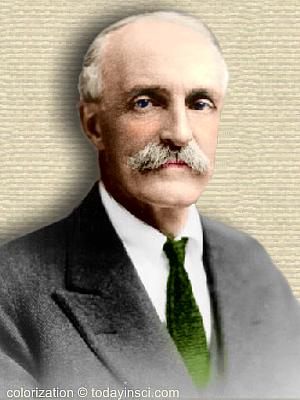 (source)
(source)
|
Gifford Pinchot
(11 Aug 1865 - 4 Oct 1946)
American forester , who as the first chief of the U.S. Forest Service popularized the conservation of natural resources.
|
The CONSERVATION OF NATURAL RESOURCES
by Gifford Pinchot
Chief of the Forest Service of the United States
[p.291] THE most prosperous nation of to-day is the United States. Our unexampled wealth and well-being are directly due to the superb natural resources of our country, and to the use which has been made of them by our citizens, both in the present and in the past. We are prosperous because our forefathers bequeathed to us a land of marvelous resources still unexhausted. Shall we conserve those resources, and in our turn transmit them, still unexhausted, to our descendants? Unless we do, those who come after us will have to pay the price of misery, degradation, and failure for the progress and prosperity of our day. When the natural resources of any nation become exhausted, disaster and decay in every department of national life follow as a matter of course. Therefore the conservation of natural resources is the basis, and the only permanent basis, of national success. There are other conditions, but this one lies at the foundation.
Perhaps the most striking characteristic of the American people is their superb practical optimism; that marvelous hopefulness which keeps the individual efficiently at work. This hopefulness of the American is, however, as short-sighted as it is intense. As a rule, it does not look ahead beyond the next decade or score of years, and fails wholly to reckon with the real future of the Nation. I do not think I have ever heard a forecast of the growth of our population that extended beyond a total of two hundred millions, and that only as a distant and shadowy goal. The point of view which this fact illustrates is neither true nor far-sighted. We shall reach a population of two hundred millions in the very near future, as time is counted in the lives of nations, and there is nothing more certain than that this country of ours will some day support double, or triple, or five times that number of prosperous people if only we can bring ourselves so to handle our natural resources in the present as not to lay an embargo on the prosperous growth of the future. We, the American people, have come into the possession of nearly four million square miles of the richest portion of the earth. It is ours to use and conserve for ourselves and our descendants, or to destroy. The fundamental question which confronts us is, What shall we do with it?
That question cannot be answered without first considering the condition of our natural resources and what is being done with them to-day. As a people, we have been in the habit of declaring certain of our resources to be inexhaustible. To no other resource more frequently than coal has this stupidly false adjective been applied. Yet our coal supplies are so far from being inexhaustible that if the increasing rate of consumption shown by the figures of the last seventy-five years continues to prevail (and there is every reason to believe that it will grow rather than lessen), our supplies of anthracite coal will last but fifty years and of bituminous coal but a little over one hundred years. From the point of view of National life, this means the exhaustion of one of the most important factors in our civilization within the immediate future. Not a few coal fields have already been exhausted, as in portions of Iowa and Missouri. Yet, in the face of these known facts, we continue to treat our coal as though there could never be an end of it. The established coal-mining practice at the present date does not take out more than one-half the coal, leaving the less easily mined or lower grade material to be made permanently inaccessible by the caving in of the abandoned workings. The loss to the Nation from this form of waste is prodigious and inexcusable.
[p.292] The waste in use is not less appalling. But five per cent of the potential power residing in the coal actually mined is saved and used. For example, only about five per cent of the power of the one hundred and fifty million tons annually burned on the railways of the United States is actually used in traction; ninety-five per cent is expended unproductively or is lost. In the best incandescent electric lighting plants but one-fifth of one per cent of the potential value of the coal is converted into light.
Many oil and gas fields, as in Pennsylvania, West Virginia, and the Mississippi Valley, have already failed, yet vast amounts of gas continue to be poured into the air and great quantities of oil into the streams. Cases are known in which vast amounts of oil are systematically burned in order to be rid of it.
The prodigal squandering of our mineral fuels proceeds unchecked in face of the fact that such resources as these, once used or wasted, can never be replaced. If waste like this were not chiefly thoughtless, it might well be characterized as the deliberate destruction of the Nation’s future.
Many fields of iron ore have already been exhausted, and in still more, as in the coal mines, only the higher grades have been taken from the mines, leaving the least valuable beds to be exploited at increased cost or not at all. Similar waste in the case of other minerals is less serious only because they are less indispensable to our civilization than coal and iron. Mention should be made of the annual loss of millions of dollars worth of by-products from coke, blast, and other furnaces, now thrown into the air, often not merely without benefit but to the serious injury of the community. In other countries these by-products are saved and used.
We are in the habit of speaking of the solid earth and the eternal hills as though they, at least, were free from the vicissitudes of time and certain to furnish perpetual support for prosperous human life. This conclusion is as false as the term “inexhaustible” applied to other natural resources. The waste of soil is among the most dangerous of all wastes now in progress in the United States. In 1896 Professor Shaler, than whom no one has spoken with greater authority on this subject, estimated that in the upland regions of the States south of Pennsylvania three thousand square miles of soil had been destroyed as the result of forest denudation, and that the destruction was then proceeding at the rate of one hundred square miles of fertile soil per year. No seeing man can travel through the United States without being struck with the enormous and unnecessary loss of fertility by easily preventable soil wash. The soil so lost, as in the case of many other wastes, becomes itself a source of damage and expense, and must be removed from the channels of our navigable streams at an enormous annual cost. The Mississippi River alone is estimated to transport yearly four hundred million tons of sediment, or about twice the amount of material to be excavated from the Panama Canal. This material is the most fertile portion of our richest fields, transformed from a blessing to a curse by unrestricted erosion.
The destruction of forage plants by overgrazing has resulted, in the opinion of men most capable of judging, in reducing the grazing value of the public lands by one-half. This enormous loss of forage, serious though it be in itself, is not the only result of wrong methods of pasturage. The destruction of forage plants is accompanied by loss of surface soil through erosion; by forest destruction; by corresponding deterioration in the water supply; and by a serious decrease in the quality and weight of animals grown on overgrazed lands. These sources of loss from failure to conserve the range are felt to-day. They are accompanied by the certainty of a future loss not less important, for range lands once badly overgrazed can be restored to their former value but slowly or not at all. The obvious and certain remedy is for the Government to hold and control the public range until it can pass into the hands of settlers who will make their homes upon it. As methods of agriculture improve and new dry-land crops are introduced, vast areas once considered unavailable for cultivation [p.293] are being made into prosperous homes, and this movement has only begun.
The single object of the public land system of the United States, as President Roosevelt has repeatedly declared, is the making and maintenance of prosperous homes. That object cannot be achieved unless such of the public lands as are suitable for settlement are conserved for the actual home-maker. Such lands should pass from the possession of the Government directly, and only into the hands of the settler who lives on the land. Of all forms of conservation there is none more important than that of holding the public lands for the actual home-maker.
It is a notorious fact that the public land laws have been deflected from their beneficent original purpose of homemaking by lax administration, shortsighted departmental decisions, and the growth of an unhealthy public sentiment in portions of the West. Great areas of the public domain have passed into the hands, not of the home-maker, but of large individual owners whose object is always the making of profit and seldom the making of homes. It is sometimes urged that enlightened self-interest will lead the men who have acquired large holdings of public lands to put them to their most productive use, and it is said with truth that this best use is the tillage of small areas by small owners. Unfortunately, the facts and this theory disagree. Even the most cursory examination of large holdings throughout the West will refute the contention that the intelligent self-interest of large owners results promptly and directly in the making of homes. Few passions of the human mind are stronger than land hunger, and the large holder clings to his land until circumstances make it actually impossible for him to hold it any longer. Large holdings result in sheep or cattle ranges, in huge ranches, in great areas held for speculative rise in price, and not in homes. Unless the American homestead system of small freeholders is to be replaced by a foreign system of tenantry, there are few things of more importance to the West than to see to it that the public lands pass directly into the hands of the actual settler instead of into the hands of the man who, if he can, will force the settler to pay him the unearned profit of the land speculator, or will hold him in economic and political dependence as a tenant. If we are to have homes on the public lands, they must be conserved for the men who make homes. The lowest estimate reached by the Forest Service of the timber now standing in the United States is 1,400 billion feet, board measure; the highest, 2,000 billion. The present annual consumption is approximately 100 billion feet, while the annual growth is but a third of the consumption, or from 30 to 40 billion feet. If we accept the larger estimate of the standing timber, 2,000 billion feet, and the larger estimate of the annual growth, 40 billion feet, and apply the present rate of consumption, the result shows a probable duration of our supplies of timber of not more than thirty-three years.
Estimates of this kind are almost inevitably misleading. For example, it is certain that the rate of consumption of timber will increase enormously in the future, as it has in the past, so long as supplies remain to draw upon. Exact knowledge of many other factors is needed before closely accurate results can be obtained. The figures cited are, however, sufficiently reliable to make it certain that the United States has already crossed the verge of a timber famine so severe that its blighting effects will be felt in every household in the land. The rise in the price of lumber which marks the opening of the present century is the beginning of a vastly greater and more rapid rise which is to come. We must necessarily begin to suffer from the scarcity of timber long before our supplies are completely exhausted. It is well to remember that there is no foreign source from which we can draw cheap and abundant supplies of timber to meet a demand per capita so large as to be without parallel in the world, and that the suffering which will result from the progressive failure of our timber was but faintly foreshadowed by the recent temporary scarcity of coal.
What will happen when the forests fail? In the first place, the business of [p.294] lumbering will disappear. It is now the fourth greatest industry in the United States. All forms of building industries will suffer with it, and the occupants of houses, offices, and stores must pay the added cost. Mining will become vastly more expensive; and with the rise in the cost of mining there must follow a corresponding rise in the price of coal, iron, and other minerals. The railways, which have as yet failed entirely to develop a satisfactory substitute for the wooden tie (and must, in the opinion of their best engineers, continue to fail), will be profoundly affected, and the cost of transportation will suffer a corresponding increase. Water power for lighting, manufacturing, and transportation, and the movement of freight and passengers by inland waterways, will be affected still more directly than the steam railways. The cultivation of the soil, with or without irrigation, will be hampered by the increased cost of agricultural tools, fencing, and the wood needed for other purposes about a farm. Irrigated agriculture will suffer most of all, for the destruction ot the forests means the loss of the waters as surely as night follows day. With the rise in the cost of producing food, the cost of food itself will rise. Commerce in general will necessarily be affected by the difficulties of the primary industries upon which it depends. In a word, when the forests fail, the daily life of the average citizen will inevitably feel the pinch on every side. And the forests have already begun to fail, as the direct result of the suicidal policy of forest destruction which the people of the United States have allowed themselves to pursue.
It is true that about twenty per cent of the less valuable timber land in the United States remains in the possession of the people in the National Forests, and that it is being cared for and conserved to supply the needs of the present and to mitigate the suffering of the near future. But it needs no argument to prove that this comparatively small area will be insufficient to meet the demand which is now exhausting an area four times as great, or to prevent the suffering I have described. Measures of greater vigor are imperatively required.
The conception that water is, on the whole, the most important natural resource has gained firm hold in the irrigated West, and is making rapid progress in the humid East. Water, not land, is the primary value in this Western country, and its conservation and use to irrigate land is the first condition of prosperity. The use of our streams for irrigation and for domestic and manufacturing uses is comparatively well developed. Their use for power is less developed, while their use for transportation has only begun. The conservation of the inland waterways of the United States for these great purposes constitutes, perhaps, the greatest single task which now confronts the Nation. The maintenance and increase of agriculture, the supply of clear water for domestic and manufacturing use, the development of electrical power, transportation, and lighting, and the creation of a system of inland transportation by water whereby to regulate freight rates by rail and to move the bulkier commodities cheaply from place to place, is a task upon whose successful accomplishment the future of the Nation depends in a peculiar degree. This is the problem to which the Inland Waterways Commission, recently appointed by President Roosevelt, has begun to address itself.
We are accustomed, and rightly accustomed, to take pride in the vigorous and healthful growth of the United States, and in its vast promise for the future. Yet we are making no preparation to realize what we so easily and glibly foresee and predict. The vast possibilities of our great future will become realities only if we make ourselves, in a sense, responsible for that future. The planned and orderly development and conservation of our natural resources is the first duty of the United States. It is the only form of insurance that will certainly protect us against disasters that lack of foresight has repeatedly brought down on nations since passed away.
- Science Quotes by Gifford Pinchot.
- 11 Aug - short biography, births, deaths and events on date of Pinchot's birth.
- More for Gifford Pinchot on Today in Science History page.
- Gifford Pinchot - context of quote “Science underlies” - Medium image (500 x 250 px)
- Gifford Pinchot - context of quote “Science underlies” - Large image (800 x 400 px)
- Breaking New Ground (autobiography), by Gifford Pinchot. - book suggestion.
- Booklist for Forest Service History.






